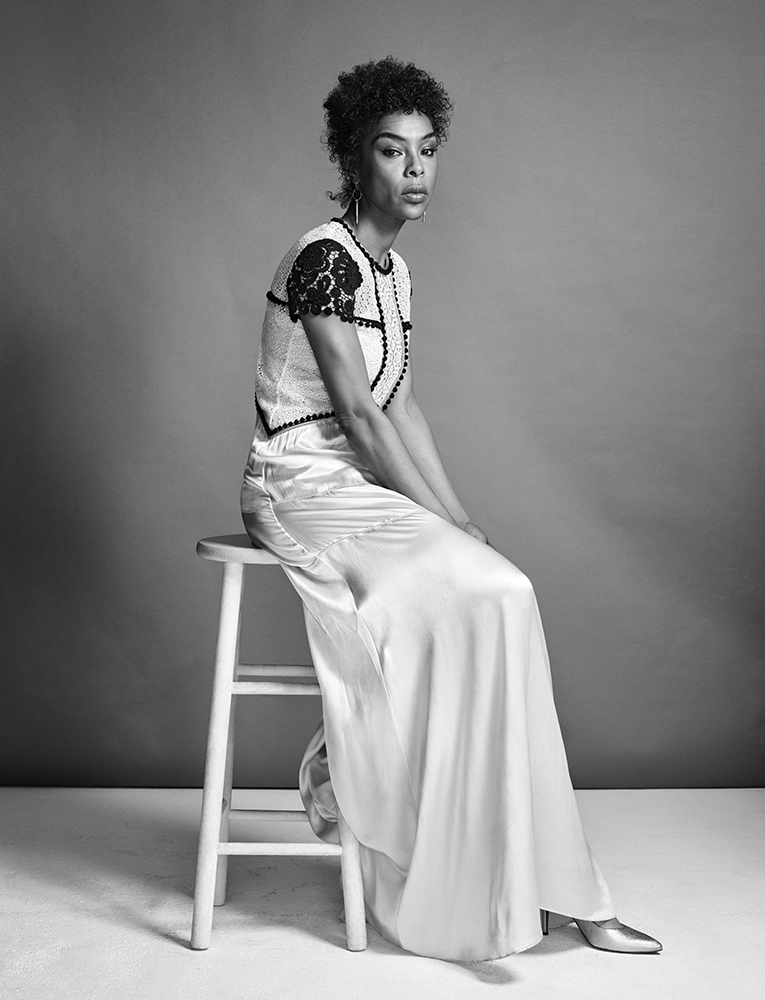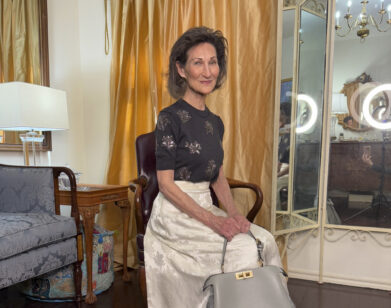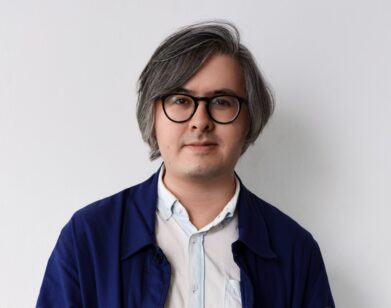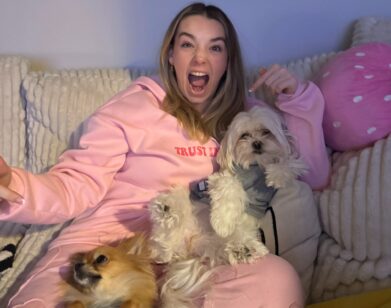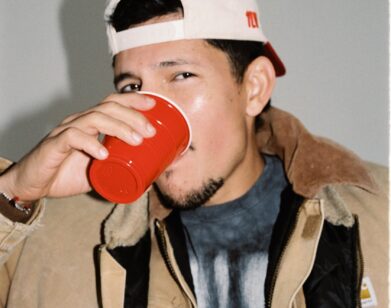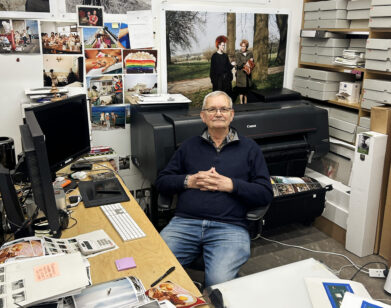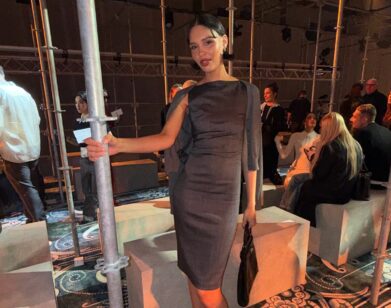Sophie Okonedo
SOPHIE OKONEDO IN NEW YORK, FEBRUARY 2016. PHOTOS: MICHAEL SCHWARTZ/DE FACTO INC. STYLING: ANGELA ESTEBAN LIBRERO. HAIR: LINDA SHALABI/SEE MANAGEMENT. MAKEUP: MICHAEL ANTHONY/TRACEY MATTINGLY. PHOTO ASSISTANTS: NATHAN MARTIN AND AMANDA YANEZ. STYLING ASSISTANT: NICK COHEN.
When Sophie Okonedo agreed to play Elizabeth Proctor in The Crucible, she had just won a Tony Award for her role in another Broadway revival, A Raisin in the Sun. Co-starring Denzel Washington and Anika Noni Rose, A Raisin in the Sun was produced by Hollywood heavyweight Scott Rudin, and it was Rudin who first approached Okonedo about Arthur Miller’s McCarthy-era classic. “I knew I couldn’t not do Elizabeth Proctor on Broadway, I couldn’t not do The Crucible,” the British actor explains. “I found myself saying ‘yes’ before I’d even thought about it.” Later on in London, Okonedo met with the play’s director Ivo van Hove. “He said, ‘I don’t know what I’m going to do, it’s so far ahead. All I know is she won’t be wearing a bonnet.'”
This week, The Crucible officially opens at the Walter Kerr Theatre on Broadway. British actor Ben Whishaw plays Elizabeth Proctor’s husband, John Proctor, with Saoirse Ronan as antagonist Abigail Williams, Tavi Gevinson as Mary Warren, and Ciarán Hinds as Deputy Governor Danforth. There are no bonnets to be found; instead, Okonedo is wearing her own muted sweater. Created with his set designer and real-life partner Jan Versweyveld, van Hove’s Salem exists outside of time and place. It isn’t exactly modern—Abigail, Mary, and the rest of the finger-pointing children are dressed in traditional school uniforms and a blackboard serves as an important set piece—but it isn’t colonial either. Nor does Van Hove dwell on the now-dusty subtext of the Red Scare. “I remember Ivo saying, ‘The McCarthy era, that’s not going to relate to a lot of young people, they’re not even going to know what that is. Let’s make something for now,'” says Okonedo. “There is no point in doing The Crucible for the hundred millionth time unless it is saying something for us now,” she continues. “That’s the reason to do a show. Otherwise you’re just doing another recap.”
Born and raised in London, Okonedo dropped out of school in her teens. She first became involved in acting through the Royal Court’s Youth Theatre program before studying at RADA. “I’m not from an acting family,” the 47-year-old emphasizes. “I’m from a working class family.”
While Okonedo has had a long and fruitful career—she received an Oscar nomination for 2004’s Hotel Rwanda and has also been nominated for a SAG Award, a Golden Globe, two BAFTAs, and two BIFAs—2016 feels like a particularly significant year. In addition to The Crucible, Okonedo will star alongside Adrian Lester and Sope Dirisu in the new BBC and BBC America thriller Undercover. Then there is The Hollow Crown, an ambitious adaptation of Shakespeare’s historical plays that first debuted in 2012 and returns for a second season later this year. Directed by Dominic Cooke, the show’s second season covers Henry VI Parts One and Two and Richard III and features Okonedo as Queen Margaret. “She is one of the greatest female Shakespeare roles,” says Okonedo of Margaret. “She starts off as this young girl and ends up this old pathetic hag and I play all of that—the girl who’s like an Amazonian warrior to the old homeless woman.”
EMMA BROWN: What was the first day of rehearsal like for The Crucible?
SOPHIE OKONEDO: Ivo described the world he thought it was, but mostly we just got up and started acting right away. He said to learn the lines before we started. There was very little discussion; we just got up and started.
BROWN: Is that normal?
OKONEDO: It’s different from how I’ve worked before, but I’ve worked in several different ways. I do know other directors who liked you to learn the words before you start, but there was no round table discussion. We just started and saw what happened. It was the most wonderful experience. Somehow it all came together. I don’t really know how it happened, but he really is one of the great directors. It happens almost without you realizing.
BROWN: Did he give notes during rehearsal?
OKONEDO: He would give you some, but the great directors know when to not say anything. He’s also really open. You can try things out and he’ll go, “Oh!” He won’t say anything more. He’ll go, “Oh, perhaps she’s a bit sadder here,” or “Perhaps you could face that way.” The one thing we did do is that I was doing an American dialect, and on the second preview he said, “Maybe it’d be nice if you and Ben [Whishaw] just spoke in your own voices.” So after doing that for five weeks, we just dropped our accents and went and did it in our own voices. That was great because it really freed things up—we were this couple at the edge of town. It felt like it could be anywhere, Salem. But it is really hard for me to talk about the piece outside it because I’m in it, and I haven’t seen a lot of the scenes. A lot of them we didn’t rehearse until we got to the theater.
BROWN: Do you watch the monitor backstage?
OKONEDO: No, I find that quite distracting. I just listen in the dressing room. But Ivo directs directly from his heart. He’s always looking for the best intentions in people.
BROWN: Did you create your own backstory for Elizabeth?
OKONEDO: It just didn’t seem right with Ivo. You’ve got to turn up, take a deep breath, and start. That’s how I did most of the rehearsals, and that’s how I do the performance. I don’t really prepare backstage; I don’t do any of that. It feels like that’s right for Ivo’s approach or for this particular show. I wouldn’t do that with every show, some shows require different things. But this is with me; other actors might have had a different experience. He doesn’t want you to discuss what you do. If you want to do something, rather than tell him what you’re going to do, just do it. And he’ll say “oh!” or he won’t say anything. If he doesn’t say anything, it’s usually good. He’ll tell you if it’s not right. [laughs]
BROWN: Was that very different from A Raisin in the Sun?
OKONEDO: Completely different director experience. Couldn’t be more different. That’s what’s so wonderful about this job—you have such a different experience and yet they’re both great shows. A Raisin in the Sun was a wonderful show, but we had a completely different way of doing it, not a way I had really rehearsed before.
BROWN: I love The Crucible‘s sound design.
OKONEDO: I love it! And also Philip [Glass]’s music. Philip was in rehearsals all the time, so was the sound designer. Music was playing while we were rehearsing—cellos coming up, cellos coming down. That was new, because usually they do that in the tech; sound comes in later. I had sound from the first time I opened my mouth as Elizabeth. It felt like a great big organic experience with music, sound design, costume—we were given costumes on day one. Some shoes would arrive; a jumper would arrive. Though the jumper I’m wearing is my jumper—I wore it on my first day of rehearsal and Ivo kept going, “I want you to wear that jumper!” He got fixated. [laughs] I think he liked it because it was very me, and he likes as much of yourself on stage as possible. That’s why he was like, “Use your own voice,” because it’s transparent.
BROWN: Do you relate to Elizabeth?
OKONEDO: I always find something in all the characters I play. I fall in love with them a little bit. At first I didn’t at all. When I was reading the play before I came, I thought, “Oh, Jesus. I don’t know how I’m going to do this.” But I do that before every part—”I don’t know how I’m going to do this. I don’t relate to the character. I don’t understand the play.” My starting point is that I spin myself into a state where I don’t understand what’s going on, and then I dig around. I started doing a little bit of research around the witch trials and Salem and then I thought I’d just learn my lines and see what happened and take a risk. My instinct was that it wasn’t going to be that sort of show. With Ivo, everything is present and very of the moment. That’s why he likes you to use yourself—you can see right in. It was really nice having the freedom of Ivo saying, “Just be true. That’s all I want.”
BROWN: You started out doing new plays, right?
OKONEDO: I started off doing new plays, and I’m really into doing some classics now. I like having the script before I start. With new plays you’re constantly developing as you’re doing it. It’s really frightening. You don’t quite know how it’s going to end up. But it was wonderful growing up in the theater with new writing at the Royal Court. You got to hear what was current, what was being talked about, what was interesting to write about. Then suddenly a few years ago I thought, “I need to go back and do more classics.”
BROWN: Is there a classic that you particularly want to do that you haven’t had the chance to yet?
OKONEDO: I’d quite like to do some Ibsen. Maybe Lady from the Sea. I don’t think I can come to Broadway [again] for a while because I keep leaving my family behind and it’s no good. I need to stay at home for a bit after this.
BROWN: I also wanted to talk about your new television show Undercover. When you first got the script, what was your reaction?
OKONEDO: I knew before the scripts were written that I was doing it. Peter Moffat and I had worked together a few years back doing Criminal Justice. Just before I came to do A Raisin in the Sun, he sent me an email saying, “I’ve got an idea for a character, I’m thinking of writing it with you in mind. Would you be interested?” And I said absolutely. I love Peter and we had a really good time last time we worked together. I thought, “Even if it ends up not being great, it’ll still be a great experience.” He’s a fiercely intelligent, profound person and I adore him. Luckily for me, when the first episode came through seven months later it was really really good! [laughs] We’d been talking about it for so long, pinging ideas between each other. I’d been very involved with it right from the beginning and involved with those scripts early on.
BROWN: Did it change at all after you got the first script?
OKONEDO: Oh, it changed all the time, even when we were filming. That’s Peter, though. That’s the way he is. He can about-turn characters. They can live or die or completely change. You don’t really know—what you start off with may not be what you end up with.
BROWN: Did you know Adrian Lester well beforehand? I know you were both in Scenes of a Sexual Nature but didn’t have any scenes together.
OKONEDO: Oh, yeah, I’ve never seen that. I know him from drama school. He’s a fantastic actor, a really good stage actor as well. I’ve known his wife Lolita for about 30 years. She was in my year at drama school and he was in the year above. They’ve been married ever since then.
BROWN: Do you generally try not to watch your own work?
OKONEDO: I never used to watch myself but I’ve got over it in the past year or two. I thought, “Oh, you’re not a child. You can watch yourself and stay separate from it.” When I was younger, I felt too sensitive—I would feel too self-conscious for the next time I acted. Now I’m experienced enough that it isn’t so much about me. I’ve got friends who I’ve worked with who want to show me their work. It’s a bit unfair to be like, “Oh, I don’t watch myself.” With Hollow Crown, I’m not going to say to Dominic, who’s a really great friend of mine, “I’m not going to watch it,” because I want to see what he’s done. That’s what would happen—I’d work with my friends who would say, “What do you think?” I decided to put my reluctance aside and suck it up.
THE CRUCIBLE OPENS MARCH 31 AT THE WALTER KERR THEATRE IN NEW YORK CITY. UNDERCOVER PREMIERES ON BBC ONE IN THE UK ON APRIL 3 AND WILL AIR ON BBC AMERICA LATER THIS YEAR.

